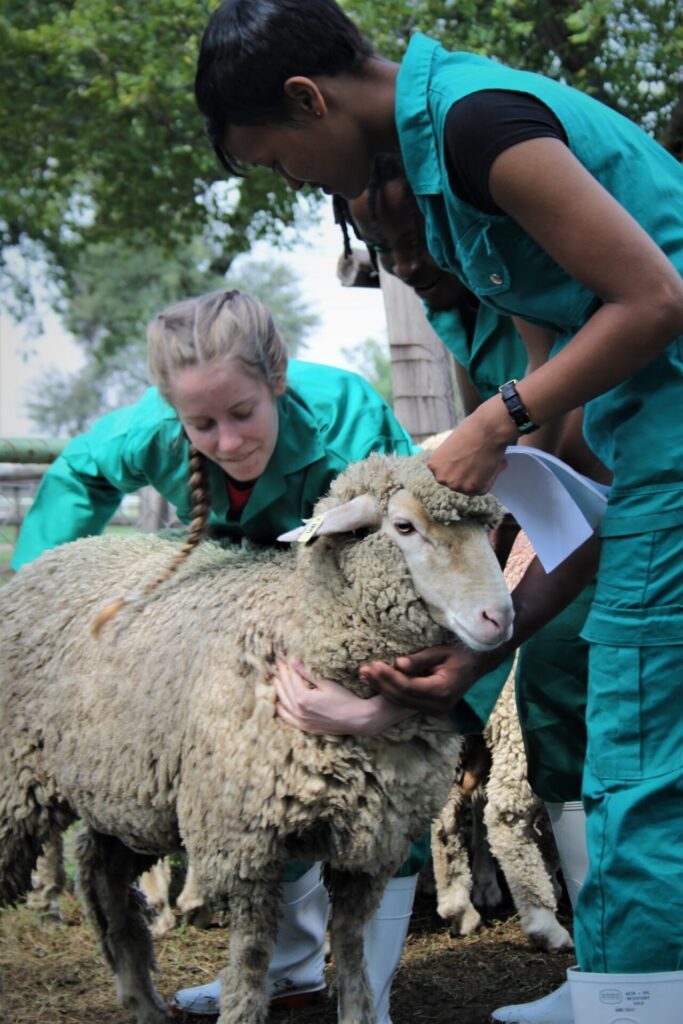Empowering veterinary paraprofessionals through education

While most people are familiar with the work of veterinarians, less may be aware of the vaccinators, laboratory workers or meat inspectors who comprise the veterinary paraprofessional workforce in many countries. In rural areas where veterinarians are lacking and populations cannot always afford their services, veterinary paraprofessionals are essential to maintain animal health, inform populations on best practices and detect animal diseases that could turn into epidemics. To support the development of their capacities and of the paraprofessional workforce in general, WOAH undertook multiple missions to advance VPP education in various countries in 2022, as part of a pilot for new “Targeted support activities” of the PVS Pathway.
Aligning veterinary paraprofessionals curricula to WOAH standards
VPP curriculum support activities took place in Togo from November 2021 to March 2022, enabling the two participating national education institutions to assess their veterinary paraprofessional training courses against WOAH’s curricula and competency guidelines.
“The analysis of our curricula showed discrepancies with WOAH guidelines. We worked in groups with the Curricula Alignement Matrix (CAM) tool provided by WOAH to improve our current academic programme so that it matched the Organisation’s recommendations”, says Dr Soedji, Director General of the National Institute for Agricultural Training (INFA) of Togo. “Our programme was organised by subject matter but after the assessment, we decided to focus on the learning objectives for veterinary paraprofessionals instead”, he explains.
Other issues included the scope of veterinary paraprofessionals’ work: “Some veterinary paraprofessionals are not fully aware of the extent of their duties and carry out medical acts that they are not supposed to do”, he stresses. WOAH support bolstered links between veterinarians in private and public practice through the harmonisation of veterinary paraprofessional training curricula.
“The training modified the way we provide our services.”
Mr Sanita Lare, veterinary paraprofessional in Togo and beneficiary of the continuous training programme in 2022.
Deploying the curricula assessment tool to reach new beneficiaries
Following the success of the pilot curriculum assessment in Togo, a similar mission was set up in Georgia in September 2022. For quality manager Ms Nino Dvali, from Amagi College in Gori, the first-of-its kind assessment for Europe allowed the Georgian team to run a diagnosis on their curricula: “We identified many gaps in our programmes. For example, we only have a few hours of laboratory training planned for the students, and we need new equipment. WOAH team helped us write recommendations for our government, as we can’t change the programmes ourselves”, she says. A shortcoming was also singled out in the study of some animal illnesses: “The experts pointed out that our curricula only covered cow, dog and cat diseases, and that there was a major gap on fish diseases”, Ms Dvali remarks.
The implementation phase of the mission is highly anticipated by Ms Dvali and her team, as the training of veterinary paraprofessionals is a critical issue in Georgia where the average age of veterinarians is above 60 and a shortage of qualified professionals is looming.

Seeing the benefits of improved training in the field
Mr Sanita Lare, a veterinary paraprofessional working in Togo, also benefited from WOAH’s education programmes in 2022. He and the other participants received continuous training with a focus on practicing and perfecting skills that ranged from animal restraint to obtaining blood samples from the tail and jugular veins. “We are trying to implement what we have learnt, like washing hands, and changing clothes and boots between inspections. The training modified the way we provide our services”, he says.
An assistant to the regional veterinary officer, Mr Lare is keenly aware of the local difficulties: “Self-medication, shortage of vaccines and a reluctance to vaccinate are major issues we see in the field”, he explains. Communicating with rural communities and animal health authorities, veterinary paraprofessionals play a major role in maintaining animal health and preventing the spread of diseases: “For instance, we are able to launch investigations if the mortality in a species is higher than usual”, he says. Proper training of this essential workforce could very well be the key element in preventing the next global health crisis, especially since 75% of the emerging diseases affecting humans originate in animals.
Supporting veterinary education: our targeted tools
In addition to empowering veterinary paraprofessionals through education, WOAH has developed a series of tools to help its Members bridge gaps in veterinary education that were identified through PVS Evaluation reports. These include guidelines on core curriculum, recommendations on the competencies of graduating veterinarians and a guide to education twinning projects.
